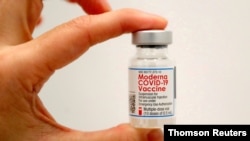The U.S. Centers for Disease Control and Prevention Thursday recommended booster shots for millions who received the Moderna or Johnson & Johnson coronavirus vaccines, and said the booster does not necessarily have to match the original shot.
Rochelle Walensky, the head of the government agency, OK’d the recommendations by an advisory panel Thursday, putting the CDC on the same page as the Food and Drug Administration.
The booster shot for Pfizer vaccine was approved in September.
The CDC committee has recommended that people age 18 and older and who were vaccinated two months or more ago with the single-dose Johnson & Johnson vaccine are eligible for a booster shot.
Those 65 or older inoculated with two-dose Pfizer or Moderna vaccines are recommended for a booster six months or more after the second dose.
The CDC also recommended a booster for those 18 or older in long-term care facilities, have pre-existing medical conditions, as well as those who live or work in high-risk settings.
The United States on Thursday marked the successful distribution of 200 million COVID-19 vaccines to more than 100 countries, a move the White House said fulfills President Joe Biden’s promise to become “the world’s arsenal of vaccines.”
“Today, Americans have 200 million reasons to be proud,” read a statement from U.S. Agency for International Development Administrator Samantha Power.
“USAID is honored to be at the forefront of this global vaccination effort unprecedented in scale, speed, and complexity, to counter the worst pandemic in modern history,” Power said.
Those donations have come rapid-fire, in a matter of months, with large tranches going out recently to lower-income nations. Last week, the White House announced it was donating 17 million doses of the one-shot Johnson & Johnson vaccine to the African Union, bringing the total donation to the 55-state body to 50 million doses.
However, an analysis by the People’s Vaccine Alliance, a coalition of nongovernmental organizations, including Oxfam and Amnesty International, shows that of the 1.8 billion doses pledged by the world’s richest nations, 261 million, or 14%, have arrived in low-income nations. The report also says that out of 994 million doses promised by vaccine developers AstraZeneca, Johnson & Johnson, Moderna and Pfizer/BioNTech to COVAX, only 120 million, or 12%, have been delivered.
The shortage has resulted in only 1.3% of people living in the world’s poorest nations being fully vaccinated against the disease caused by the coronavirus.
Meanwhile, researchers around the world are keeping a close eye on a mutation of the highly contagious delta variant of the coronavirus.
The AY.4.2 subvariant, which has been dubbed “delta plus,” has already been detected in Britain, Russia and the United States, but scientists have not determined if it poses a significant risk of being more contagious than the original version, which triggered a wave of new infections and deaths around the world during this year’s third quarter, or whether it is more resistant to vaccines.
The AY.4.2 variant has not been categorized as either a “variant of interest” or “variant of concern” by the World Health Organization.
In Britain, Prime Minister Boris Johnson is resisting calls by some public health officials to implement new COVID-19 restrictions, despite a surge of new infections hitting the nation.
The Health Ministry reported 52,000 new infections on Thursday, with a daily average the past week of more than 44,000 — a 16% increase from the previous week.
The World Health Organization reported this week that Britain has among the highest number of daily new infections in Europe, the only part of the world that saw an increase in new cases last week.






